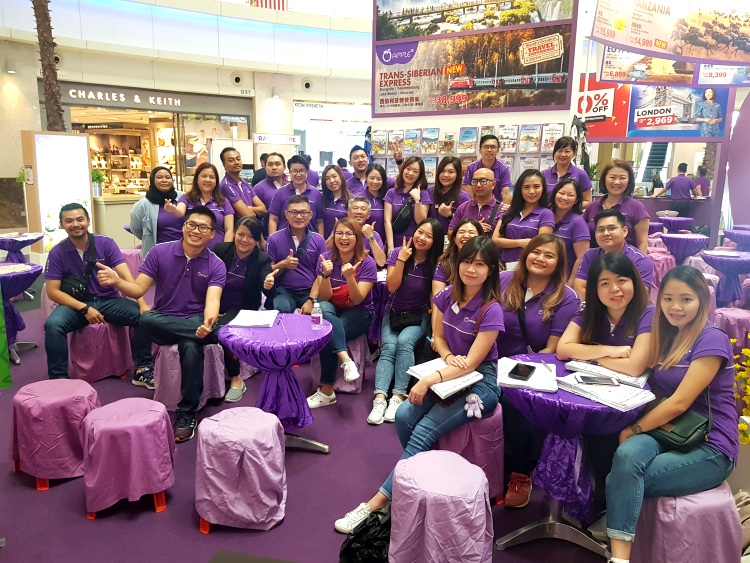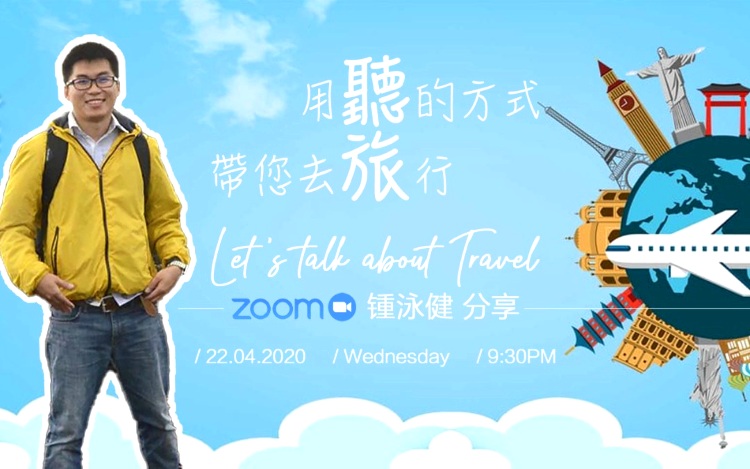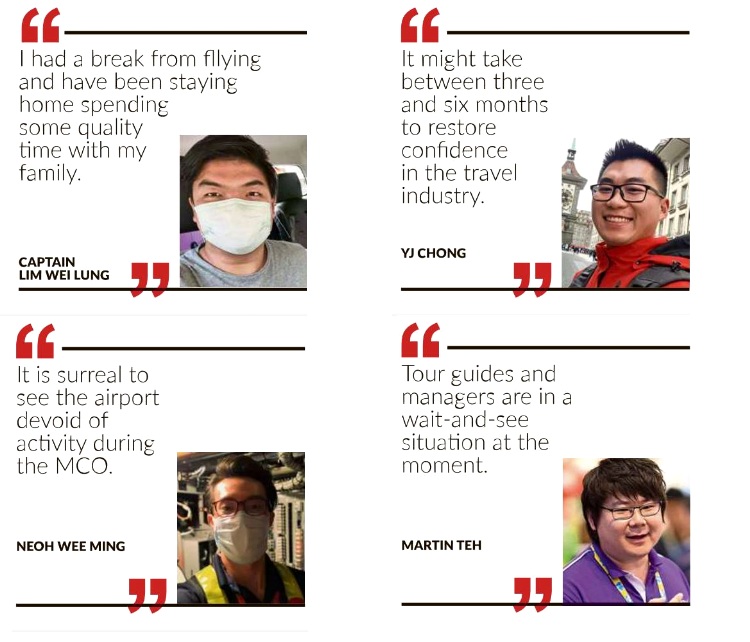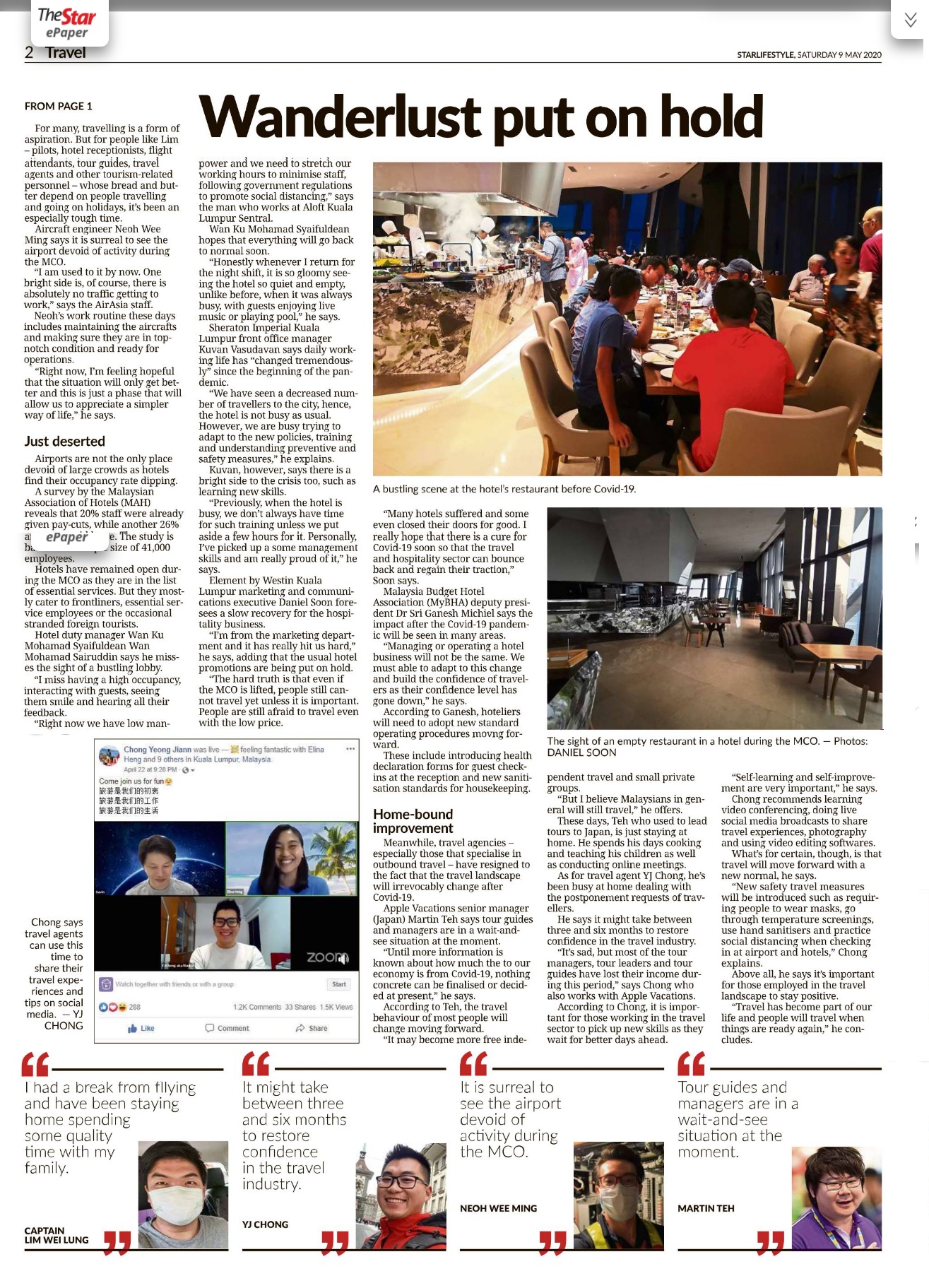Wanderlust put on hold
CAPTAIN Lim Wei Lung has what many would call a dream job. As a commercial pilot, the man has flown to many different corners of the world. He has seen up close beautiful cloud formations of the blue skies above and the breathtaking sceneries of green fields below.But as dreams go, sometimes there are the occasional nightmares. And one that Lim, and many all over the world, currently face is the Covid-19 pandemic.
Since the coronavirus outbreak, the AirAsia pilot has found his vocation grinding to a halt. It became more challenging when Malaysia put in place the movement control order (MCO) on March 18.
“Since our government implemented the MCO, the airline has reduced most of its flights and then went into hibernation.
“Therefore, I had a break from flying and have been staying home, spending some quality time with my family,” says Lim.
During this time, Lim has signed up for online courses to reskill and upskill for a new business environment in the near future.
Apart from that, the pilot has offered to be a delivery partner with Teleport, the logistics arm of AirAsia.
“At the moment my daily tasks involve delivering essential goods for customers and also helping the team to monitor the delivery operations from the back end,” Lim says.
The pilot with nine-years flying experience adds that he likes the exposure to logistics business.
AirAsia has since resumed operations of selected networks. For many, travelling is a form of aspiration. But for people like Lim – pilots, hotel receptionists, flight attendants, tour guides, travel agents and other tourism-related personnel – whose bread and butter depend on people travelling and going on holidays, it’s been an especially tough time.
Aircraft engineer Neoh Wee Ming says it is surreal to see the airport devoid of activity during the MCO.
“I am used to it by now. One bright side is, of course, there is absolutely no traffic getting to work,” says the AirAsia staff.
Neoh’s work routine these days includes maintaining the aircrafts and making sure they are in top-notch condition and ready for operations.
“Right now, I’m feeling hopeful that the situation will only get better and this is just a phase that will allow us to appreciate a simpler way of life,” he says.
Just deserted
Airports are not the only place devoid of large crowds as hotels find their occupancy rate dipping.
A survey by the Malaysian Association of Hotels (MAH) reveals that 20% staff were already given pay-cuts, while another 26% are on unpaid leave. The study is based on a sample size of 41,000 employees.
Hotels have remained open during the MCO as they are in the list of essential services. But they mostly cater to frontliners, essential service employees or the occasional stranded foreign tourists.
Hotel duty manager Wan Ku Mohamad Syaifuldean Wan Mohamad Sairuddin says he misses the sight of a bustling lobby.
“I miss having a high occupancy, interacting with guests, seeing them smile and hearing all their feedback.
“Right now we have low manpower and we need to stretch our working hours to minimise staff, following government regulations to promote social distancing,” says the man who works at Aloft Kuala Lumpur Sentral.
Wan Ku Mohamad Syaifuldean hopes that everything will go back to normal soon.
“Honestly whenever I return for the night shift, it is so gloomy seeing the hotel so quiet and empty, unlike before, when it was always busy, with guests enjoying live music or playing pool,” he says.
Sheraton Imperial Kuala Lumpur front office manager Kuvan Vasudavan says daily working life has “changed tremendously” since the beginning of the pandemic.
“We have seen a decreased number of travellers to the city, hence, the hotel is not busy as usual. However, we are busy trying to adapt to the new policies, training and understanding preventive and safety measures,” he explains.
Kuvan, however, says there is a bright side to the crisis too, such as learning new skills.
“Previously, when the hotel is busy, we don’t always have time for such training unless we put aside a few hours for it. Personally, I’ve picked up a some management skills and am really proud of it,” he says.
Element by Westin Kuala Lumpur marketing and communications executive Daniel Soon foresees a slow recovery for the hospitality business.
“I’m from the marketing department and it has really hit us hard,” he says, adding that the usual hotel promotions are being put on hold.
“The hard truth is that even if the MCO is lifted, people still cannot travel yet unless it is important. People are still afraid to travel even with the low price.
“Many hotels suffered and some even closed their doors for good. I really hope that there is a cure for Covid-19 soon so that the travel and hospitality sector can bounce back and regain their traction,” Soon says.
Malaysia Budget Hotel Association (MyBHA) deputy president Dr Sri Ganesh Michiel says the impact after the Covid-19 pandemic will be seen in many areas.
“Managing or operating a hotel business will not be the same. We must able to adapt to this change and build the confidence of travelers as their confidence level has gone down,” he says.
According to Ganesh, hoteliers will need to adopt new standard operating procedures movng forward.
These include introducing health declaration forms for guest check-ins at the reception and new sanitisation standards for housekeeping.
Home-bound improvement
Meanwhile, travel agencies – especially those that specialise in outbound travel – have resigned to the fact that the travel landscape will irrevocably change after Covid-19.
Apple Vacations Senior Manager (Japan)
Martin Teh
“Until more information is known about how much the to our economy is from Covid-19, nothing concrete can be finalised or decided at present,” he says.
According to Teh, the travel behaviour of most people will change moving forward.
“It may become more free independent travel and small private groups.
“But I believe Malaysians in general will still travel,” he offers.
These days, Teh who used to lead tours to Japan, is just staying at home. He spends his days cooking and teaching his children as well as conducting online meetings.

Photo during tour leading in Hokkaido Japan winter.
Martin misses the traveling time, the people and friends that I get to meet.
Apple Vacations Senior Manager of Sales & Marketing (West) YJ Chong
He says it might take between three and six months to restore confidence in the travel industry.
“It’s sad, but most of the tour managers, tour leaders and tour guides have lost their income during this period,” says Chong who also works with Apple Vacations.
According to Chong, it is important for those working in the travel sector to pick up new skills as they wait for better days ahead.
“Self-learning and self-improvement are very important,” he says.
Chong recommends learning video conferencing, doing live social media broadcasts to share travel experiences, photography and using video editing softwares.
What’s for certain, though, is that travel will move forward with a new normal, he says.
“New safety travel measures will be introduced such as requiring people to wear masks, go through temperature screenings, use hand sanitisers and practice social distancing when checking in at airport and hotels,” Chong explains.Above all, he says it’s important for those employed in the travel landscape to stay positive.
“Travel has become part of our life and people will travel when things are ready again,” he concludes.

Chong says travel agents can use this time to share their travel experiences and tips on social media – by YJ Chong

Working life in 2019 Apple Travel Fiesta with my co colleague & we are “Proud to be Applenian”! – by YJ Chong
Published in StarLifestyle – Travel, 9 May 2020
The post Wanderlust put on hold appeared first on Apple 101°.
更多旅游资讯:www.mamaktalk.com獨家旗袍照曝光 大馬正妹明禎賀年
>>> http://www.38today.com/2015/02/blog-post_332.html


